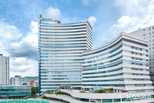
Newsnomics ANGELINA AJAY reporter |
A total of 58.6% foreign workers wanted to change jobs cited “low wages and dangerous work” as reasons for changing jobs as per previous year report.
On April 17, the results of “the Immigrant Status and Employment Survey” announced by Statistics Korea showcase the percentage of foreign wage earners who wanted to change jobs was 12.3% last year. The most common reason counted was 'the low wages’ showed 39.2% and ‘dangerous and difficult works’ showed 19.4%.
If we look at the residency status, the proportion of workers who wanted to change jobs due to 'low wages' was highest among permanent residents (44.8%) followed by the international students (44.4%) and professionals (42.5%). However, the proportion of foreign workers who wanted to change jobs because of ‘dangerous or difficult work’ was highest counted 36.0% among ‘Employment Visit’ allows foreign nationals living in the former Soviet Union and China to work in 38 industries under the Special Employment Permit System, 23.3% among marriage immigrants and about 23.0% among overseas Koreans.
13.5% of foreign residents in Korea responded that they have experienced economic difficulties in the previous year. In this regard, the proportion of international students was the highest counted 21.5%, followed by visiting employment (16.3%) and overseas Koreans (14.8%). In particular, 46.4% of overseas Koreans and 43.0% of working foreigners responded that they did not receive medical treatment due to the burden of hospital costs.
Last year, the majority of foreign workers' weekly working hours were 40 to 50 hours at 56.5%. However, a total of 28.6% workers counted to be active in working with more than 50~60 hours include 18.1% workers worked more than 50 hours, whereas the workers who worked more than 60 hours were counted to 10.5%.
By residency status, the proportion of workers working more than 50 hours was relatively high counted 35.6% among the workers of ‘Non-professional employment’ a status of residence available to foreign workers from 16 countries that have concluded employment permit agreements and 30.3% in among Employment visit immigrants.
It was found that 50.6% of foreign wage earners receive an average monthly wage of 2 to 3 million won.
By following the residence status in the Republic of Korea, the proportion receiving a wage of 2 to 3 million won was high in the following order: non-professional employment (66.5%), professional labor (53.9%), and visiting employment (51.5%). On the other hand, 88.0% of international students were found to receive a monthly salary of less than 2 million won.
The job satisfaction rate of foreign workers was 62.6%, of which the satisfaction rate of non-professional workers was relatively high counted 71.1%.
The National Statistical Office explains, “the fact that non-professional workers come from countries with a relatively low economic level compared to other residency statuses had an impact.”
If we look at the residency status by nationality, the non-professional employment took up a high proportion of other Asian countries, such as Uzbekistan and the Philippines counted 86.9%.
The largest number of job seekers were Korean-Chinese (84.5%), also known as 'Korean-Chinese', followed by Vietnamese (34.6%) and Chinese (29.9%) international.










